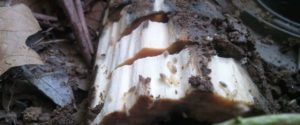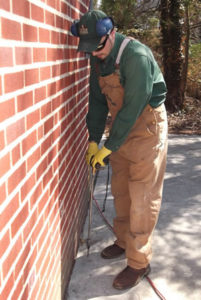 Termites are little wood eating insects that can wreak havoc on a property. They can damage the overall value and structural integrity of your foundation and cost homeowners thousands of dollars in repairs. The best way to deal with termites is to find and eradicate them before they cause major damage.
Termites are little wood eating insects that can wreak havoc on a property. They can damage the overall value and structural integrity of your foundation and cost homeowners thousands of dollars in repairs. The best way to deal with termites is to find and eradicate them before they cause major damage.
Termite Damage in Homes
The small, translucent insects called termites have been on Earth for millions of years. While primitive, their lifespan is structured much like that of the ant. They live in colonies, with each termite responsible for a specific duty to keep the colony thriving.
Termites need one thing to survive: a steady supply of wood. They find feasts to last them years in our homes, almost always requiring the services of pest control in Baltimore for extermination. Left unchecked, termites will eat their way into a home and create billions of dollars’ worth of damage in homes throughout the country. Whether your home is in a dry, damp, or moist environment, there are species of termites that specialize in destroying your wood.
Signs of Termites in Your Baltimore Home
Unless you start to notice signs of a termite infestation, you may not realize that the small, countless creatures have invaded until after the damage is done. When you are completing spring cleaning, doing yardwork, or otherwise working in and around your home, keep an eye out for these signs of infestation:
- Wings. – When insects reproduce during spring, they come out of their colonies in the wood to mate. You may notice piles of wings in the areas where they are most likely to appear, including windowsills, floorboards, and any wooden areas around your home.
- Swarms. – Young termites also take flight during spring for reproduction and to establish new colonies. If you notice flying bugs in your home, you may mistake them for another insect. Termite wings are all very close to the same size, and their antennae are straight. Look in nearby spider webs for any termites that may have been captured.
- Mud tubes. – When termites are not moving through tunnels they have created in wood, they need protection. They may rely on mud tubing to move around your home’s basement or foundation. The tubes look similar to dirt dobber tubes, but are generally smaller and closer to the ground. If you see any mud tubing, break off a piece to identify any insects within and check back after a few days. You have an active infestation if the broken tubing has been replaced.
- Woodpecker drilling. – If a woodpecker has started drilling into your home, you will likely notice the damage quickly. Sometimes they drill into homes to get to an insect infestation, including termites. If you contact a pest control company for a woodpecker problem, make sure the professionals also inspect the site for insects to eliminate further damage.
- Hollow wood. – Wooden beams that termites have tunneled through will sound hollow. If you have access to the beams and studs throughout your home, do a tapping test. Wood that sounds hollow may be infested.
- Visual damage. – In advanced infestations, you may not notice an infestation until you can physically see the damage they are doing to wooden structures. Termite damage often looks like columns of uneven drilling in the wood, leaving fragile pieces near the surface that will break off or crumble in your hand. The structural integrity of the wood may be completely demolished, and the wood may look like it has been abandoned for years.
- Termite poo. – Termite droppings are called frass and look like small seeds or sand. You may notice piles of this wooden, pellet-like substance before seeing wood damage. Look around your windows and floors where they meet the wall to find this indicator.
What to Do When You See the Signs
 At the first sign of an infestation, homeowners in the area should consider contacting a comprehensive Baltimore pest control company like Brody Brothers. Your local pest control company knows how to pinpoint the type of infestation you have and evaluate your home fully to ensure the problem is eliminated once and for all.
At the first sign of an infestation, homeowners in the area should consider contacting a comprehensive Baltimore pest control company like Brody Brothers. Your local pest control company knows how to pinpoint the type of infestation you have and evaluate your home fully to ensure the problem is eliminated once and for all.
In Baltimore, the most common type of termite infestation is caused by the eastern subterranean termite. Brody Brothers technicians take a comprehensive approach to termite infestations. When our crews arrive, we look around the home for further signs of infestation to identify the problem areas and create a customized solution that works with your lifestyle and needs. Whether we use bait traps or other treatment methods, our goal is to make sure you never have to deal with the structural damage caused by termites again.
After the immediate threat has been eliminated, we encourage customers to consider maintenance and prevention plans that include monitoring inspections for your home or office. Our Home Protection Plan includes regular termite inspections, recommendations for prevention, discounts on other services, and seasonal treatments for several common insects. Many homeowners find the cost of prevention services far outweighs the cost of repairing damage over time.
Take Steps to Discourage Termites in the Home
One of the best ways to approach home infestations is to develop practices to discourage them early on. Keep termite colonies from viewing your home as a prime target by:
- Ensuring proper drainage. – Termites like moisture. Make sure your yard drains adequately. Check drainage pathways and gutter systems for pooling water.
- Removing debris around the home. – Plants near the foundation, mulch, and debris in gutters are signals to termites that your home is a waiting feast. Remove storm debris regularly, clean your gutters, and store firewood away from your house.
- Practice good home maintenance. – Keep wood around the property treated, repair cracks and holes in both concrete and wooden walls, and keep everything painted or otherwise treated. You can apply special paints and stains to repel termites, or (if undertaking a new project) start with termite-proof materials.
By taking steps to discourage termites and proactively addressing infestations, you can keep these wood devouring insects out of your home for good.

